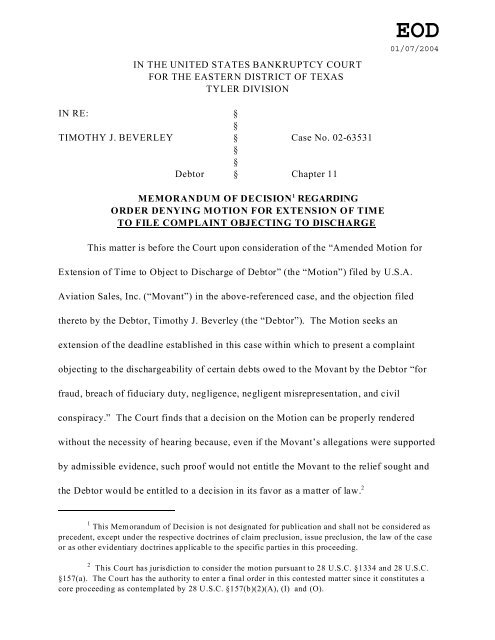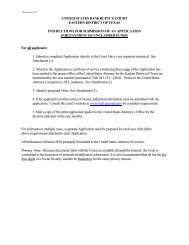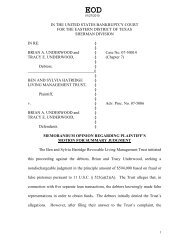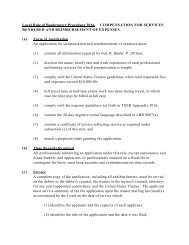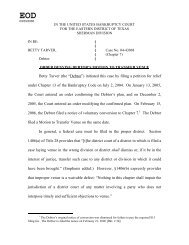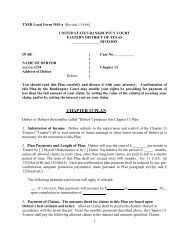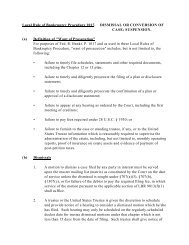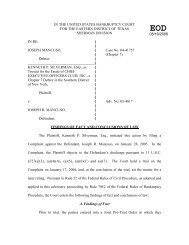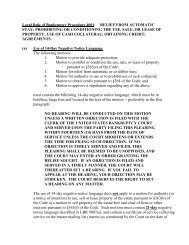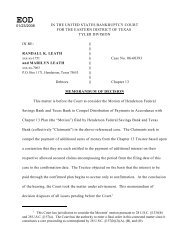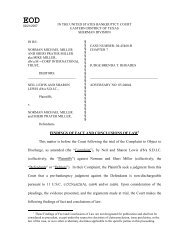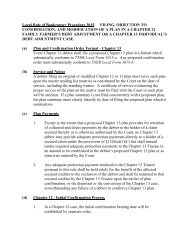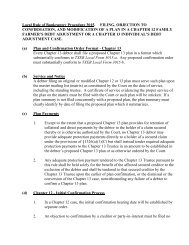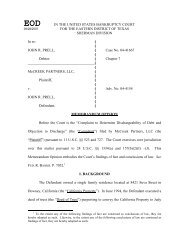TIMOTHY J. BEVERLEY § Case - Eastern District of Texas
TIMOTHY J. BEVERLEY § Case - Eastern District of Texas
TIMOTHY J. BEVERLEY § Case - Eastern District of Texas
Create successful ePaper yourself
Turn your PDF publications into a flip-book with our unique Google optimized e-Paper software.
IN THE UNITED STATES BANKRUPTCY COURT<br />
FOR THE EASTERN DISTRICT OF TEXAS<br />
TYLER DIVISION<br />
IN RE: §<br />
§<br />
<strong>TIMOTHY</strong> J. <strong>BEVERLEY</strong> § <strong>Case</strong> No. 02-63531<br />
§<br />
§<br />
Debtor § Chapter 11<br />
MEMORANDUM OF DECISION 1 REGARDING<br />
ORDER DENYING MOTION FOR EXTENSION OF TIME<br />
TO FILE COMPLAINT OBJECTING TO DISCHARGE<br />
This matter is before the Court upon consideration <strong>of</strong> the “Amended Motion for<br />
Extension <strong>of</strong> Time to Object to Discharge <strong>of</strong> Debtor” (the “Motion”) filed by U.S.A.<br />
Aviation Sales, Inc. (“Movant”) in the above-referenced case, and the objection filed<br />
thereto by the Debtor, Timothy J. Beverley (the “Debtor”). The Motion seeks an<br />
extension <strong>of</strong> the deadline established in this case within which to present a complaint<br />
objecting to the dischargeability <strong>of</strong> certain debts owed to the Movant by the Debtor “for<br />
fraud, breach <strong>of</strong> fiduciary duty, negligence, negligent misrepresentation, and civil<br />
conspiracy.” The Court finds that a decision on the Motion can be properly rendered<br />
without the necessity <strong>of</strong> hearing because, even if the Movant’s allegations were supported<br />
by admissible evidence, such pro<strong>of</strong> would not entitle the Movant to the relief sought and<br />
the Debtor would be entitled to a decision in its favor as a matter <strong>of</strong> law. 2<br />
1 This Memorandum <strong>of</strong> Decision is not designated for publication and shall not be considered as<br />
precedent, except under the respective doctrines <strong>of</strong> claim preclusion, issue preclusion, the law <strong>of</strong> the case<br />
or as other evidentiary doctrines applicable to the specific parties in this proceeding.<br />
2 This Court has jurisdiction to consider the motion pursuant to 28 U.S.C. §1334 and 28 U.S.C.<br />
§157(a). The Court has the authority to enter a final order in this contested matter since it constitutes a<br />
core proceeding as contemplated by 28 U.S.C. §157(b)(2)(A), (I) and (O).
Factual and Procedural Background<br />
The Court's docket establishes the relevant facts in this case. The Debtor filed a<br />
voluntary petition under Chapter 11 <strong>of</strong> the Bankruptcy Code on September 24, 2002. The<br />
notice sent to creditors on or about September 27, 2002, which scheduled the §341(a)<br />
creditors' meeting, also referenced the “Deadline to File a Complaint Objecting to<br />
Discharge <strong>of</strong> the Debtor” (the “Objection Deadline”) which set the deadline for creditors<br />
to file a complaint objecting to the discharge <strong>of</strong> the Debtor as the “first date set for<br />
hearing on confirmation <strong>of</strong> plan.” That noticed deadline simply reflected the deadline<br />
actually established by Fed. R. Bankr. P. 4004(a), and the notice to creditors added that<br />
“[n]otice <strong>of</strong> that date will be sent at a later time.”<br />
Although a listing was also given in the notice regarding the “Deadline to File a<br />
Complaint to Determine Dischargeability <strong>of</strong> Certain Debts” (the “Exception Deadline”),<br />
absolutely no information was provided in the notice as to the Exception Deadline, even<br />
though Fed. R. Bankr. P. 4007(c) clearly establishes that deadline by its declaration that<br />
“[A] complaint to determine the dischargeability <strong>of</strong> a debt under §523(c) shall be filed no<br />
later than 60 days after the first date set for the meeting <strong>of</strong> creditors under §341(a).”<br />
Thus, though such date was not noticed to creditors through the §341 notice as required<br />
by Fed. R. Bankr. P. 2002(f)(5), the deadline fixed by Rule 4007(c) was December 16,<br />
2002. 3<br />
3<br />
The sixtieth day actually fell on Sunday, December 15, 2002; thus, the deadline was extended<br />
to Monday, December 16 th pursuant to Fed. R. Bankr. P. 9006(a).<br />
-2-
On November 13, 2002, the Court granted without objection the Debtor's Motion<br />
for Joint Administration <strong>of</strong> <strong>Case</strong>s whereby the above-referenced case was jointly<br />
administered with three related cases with the directive that all pleadings affecting the<br />
Debtor's case (other than those specifically designated) were to be filed under the Tyler<br />
Jet, L.L.C. case, case no. 02-11164.<br />
On November 26, 2002, the Movant filed its original Motion for Extension <strong>of</strong><br />
Time to Object to Discharge <strong>of</strong> Debtor. Though the title <strong>of</strong> such motion might be<br />
ambiguous, the motion specifically references a dispute between the parties <strong>of</strong> a type<br />
which would relate solely to the Exception Deadline. Since no plan <strong>of</strong> reorganization had<br />
yet been proposed for the Debtor as <strong>of</strong> that time and the December 16 th Exception<br />
Deadline had not yet passed, such motion was timely as to either deadline.<br />
On December 12, 2002, the Movant mistakenly filed a Notice <strong>of</strong> Withdrawal <strong>of</strong><br />
Motion for Extension <strong>of</strong> Time to Object to Discharge <strong>of</strong> Debtor which specifically stated<br />
that “U.S.A. Aviation Sales, Inc. has determined that such Motion for Extension <strong>of</strong> Time<br />
to Object to Discharge <strong>of</strong> Debtor is premature and therefore, withdraws such Motion<br />
without prejudice for the refiling <strong>of</strong> such Motion at a later date.” Though premature as to<br />
the Objection Deadline, 4 the extension motion was clearly not premature as to the<br />
December 16 th Exception Deadline.<br />
4<br />
It was premature since the specific calendar date <strong>of</strong> the Rule 4004 deadline was not yet capable<br />
<strong>of</strong> identification due to the fact that no plan had been filed by the Debtor as <strong>of</strong> that time. The Court<br />
ultimately established August 13, 2003 as the first date to consider confirmation <strong>of</strong> the Debtors' proposed<br />
joint Chapter 11 plan and, therefore, such date became the specific Objection Deadline.<br />
-3-
Some months later, on May 20, 2003, the Movant filed a (Second) Motion for<br />
Extension <strong>of</strong> Time to Object to Discharge <strong>of</strong> Debtor, which was subsequently amended<br />
on May 22, 2003, and again on June 18, 2003, the latter <strong>of</strong> which stands as the current<br />
Motion. The Motion confirms the previous withdrawal was “based upon a mistaken<br />
interpretation . . . [that] the deadline for objecting to discharge <strong>of</strong> the Debtor . . . was<br />
interpreted to also be the deadline to file a complaint to determine dischargeability <strong>of</strong><br />
certain debts. Based upon that mistaken interpretation, a Notice <strong>of</strong> Withdrawal <strong>of</strong> Motion<br />
for Extension <strong>of</strong> Time was filed on December 12, 2002.” The Motion thus confirms that,<br />
notwithstanding its title, the requested extension relates to the Exception Deadline and it<br />
asks for the prior December 2002 motion for extension <strong>of</strong> time to be reinstated and that<br />
additional time be given for further amendments to reflect current circumstances. The<br />
Debtor has objected to the Motion on the ground that such relief cannot be legitimately<br />
granted.<br />
Discussion<br />
Fed. R. Bankr. P. 4007(c) provides that, in a case under Chapter 7, 11, or 12:<br />
A complaint to determine the dischargeability <strong>of</strong> a debt under §523(c) shall<br />
be filed no later than 60 days after the first date set for the meeting <strong>of</strong><br />
creditors under §341(a). The court shall give all creditors no less than 30<br />
days' notice <strong>of</strong> the time so fixed in the manner provided in Rule 2002. On<br />
motion <strong>of</strong> a party in interest, after hearing on notice, the court may for cause<br />
extend the time fixed under the subdivision. The motion shall be filed<br />
before the time has expired.<br />
-4-
FED. R. BANKR. P. 4007(c) (emphasis added).<br />
It is undisputed in the present instance that the timely motion for extension <strong>of</strong> time was<br />
withdrawn by the Movant on December 12, 2002. Accordingly, absent some additional<br />
action to preserve its validity, the present Motion, filed originally on May 20, 2003, is<br />
untimely under the express provisions <strong>of</strong> Fed. R. Bankr. P. 4007(c).<br />
However, the Movant asks the Court to allow its rescission <strong>of</strong> that withdrawal and<br />
to treat the current Motion as though it was filed on December 12, 2002, because its<br />
withdrawal <strong>of</strong> that original extension motion was based upon mistake and its erroneous<br />
interpretation <strong>of</strong> the §341 notice. Essentially, the Movant is asking the Court to exercise<br />
the discretion normally provided to it under Fed. R. Bankr. P. 9006(b). Rule 9006(b)<br />
provides that:<br />
when an act is required or allowed to be done at or within a specified period<br />
by these rules . . . the court for cause shown may at any time in its<br />
discretion . . . (2) on motion made after the expiration <strong>of</strong> the specified<br />
period permit the act to be done where the failure to act was the result <strong>of</strong><br />
excusable neglect. 5<br />
While the Court might in other circumstances be authorized to act to relieve the<br />
Movant from the consequences <strong>of</strong> its mistake, the exercise <strong>of</strong> such authority in this<br />
instance is expressly prohibited by Fed. R. Bankr. P. 9006(b)(3) which permits an<br />
5<br />
See, Pioneer Investment Services Co. v. Brunswick Associates Ltd. Partnership, 507 U.S. 380,<br />
113 S.Ct. 1489, 123 L. Ed. 2d 74 (1993).<br />
-5-
extension <strong>of</strong> time under Rule 4007(c) only “to the extent and under the conditions stated”<br />
in such rule . . . i.e, only if the creditor files a motion for extension before the 60-day<br />
period expires and then only “for cause.” As one well-known treatise explains,<br />
The motion must be filed within the original time period allowed for<br />
dischargeability complaints. If the motion is not filed within that time<br />
period, the court has no discretion to grant the motion. Moreover, Rule<br />
9006(b)(3) makes clear that the normal rule allowing an extension <strong>of</strong> time<br />
by motion filed after a time period has expired does not apply to the<br />
deadline set by Rule 4007. This rule marks a change from the practice<br />
under the former bankruptcy rules, which permitted a court to grant a<br />
motion filed after expiration <strong>of</strong> the time period allowed upon a showing <strong>of</strong><br />
excusable neglect.<br />
9 COLLIER ON BANKRUPTCY 4007.04[3][a] at p. 4007-15 (15 th ed. rev. 2003).<br />
This limitation on the Court's ability to provide the requested relief was recently<br />
confirmed by the Fifth Circuit in Dunlap v. Dunlap (In re Dunlap), 217 F.3d 311 (5 th Cir.<br />
2000) in which it explained that:<br />
Rule 4007(c) must be read in conjunction with Rule 9006(b)(3) which<br />
permits a bankruptcy court to “enlarge the time for taking action under<br />
[Rule 4007] . . . only to the extent and under the conditions stated in [that<br />
rule].” Fed. R. Bankr. P. 9006(b)(3). The strict time limitation placed upon<br />
creditors who wish to object to a debt's dischargeability reflects the<br />
Bankruptcy Code's goal <strong>of</strong> providing debtors with a fresh start. Rule<br />
4007(c) evince[s] a strong intent that the participants in bankruptcy<br />
proceedings be assured that, within the set period <strong>of</strong> 60 days, they can know<br />
which debts are subject to an exception to discharge. Also, this fixed,<br />
-6-
elatively short limitation period enables the debtor and creditors to make<br />
better-informed decisions early in the proceedings.<br />
Dunlap, 217 F.3d at 315 (citations and quotations omitted); see also In re Butler, 237<br />
B.R. 611, 615 (Bankr. N.D. Miss. 1999)[noting that “the Fifth Circuit has refused to<br />
extend, waive, or modify the sixty day limitations period in practically every factual<br />
scenario”].<br />
This restriction on the Court’s inability to grant the requested relief is not affected<br />
by the fact that the Bankruptcy Clerk failed to place the Exception Deadline in the §341<br />
notice. That specific scenario was addressed by the Fifth Circuit in Neeley v. Murchison,<br />
815 F.2d 345 (5 th Cir. 1987), in which the space provided in the §341 notice for the entry<br />
<strong>of</strong> the deadline to file complaints to determine dischargeability was not only left blank,<br />
but the creditors' attorneys were orally informed by Clerk's <strong>of</strong>fice personnel upon<br />
subsequent inquiry that no such deadline had been set. In rejecting the creditor's<br />
argument that the clerk's failure to give the 30-day notice <strong>of</strong> the deadline pursuant to Rule<br />
2002(f) suspended the running <strong>of</strong> the limitation period, the Fifth Circuit found that,<br />
because <strong>of</strong> the specific interaction <strong>of</strong> Rules 4007 and 9006(b)(3) and the creditor's<br />
specific knowledge <strong>of</strong> the existence <strong>of</strong> the case (a fact which is not in dispute in the<br />
present case), creditor's counsel could not reasonably rely on the blank notice, nor even<br />
the oral assurances from the Clerk's staff, but instead had an affirmative duty to comply<br />
fully with the directives <strong>of</strong> Rule 4007(c). See also, In re Hammons, 252 B.R. 97, 99-100<br />
(Bankr. N.D. Miss. 2000)[“Within the Fifth Circuit, the 60-day period for filing<br />
-7-
complaints has been strictly enforced even in instances where the notice received by the<br />
creditor was defective or even non-existent.”](citing Ramos v. Compton (In re Compton),<br />
891 F.2d 1180 (5 th Cir. 1990) and Grossie v. Sam (In re Sam), 894 F.2d 778 (5 th Cir.<br />
1990)).<br />
Because a bankruptcy court is authorized to grant an extension <strong>of</strong> time under Rule<br />
4007(c) only to the extent and under the conditions stated in such rule, and because such<br />
conditions were not satisfied in this case, the Court is without authority to grant the relief<br />
sought by the Motion. Accordingly, the Amended Motion for Extension <strong>of</strong> Time to<br />
Object to Discharge <strong>of</strong> Debtor filed by U.S.A. Aviation Sales, Inc. in the abovereferenced<br />
case must be denied and an appropriate order shall be entered which is<br />
consistent with this opinion.<br />
_________________________________________<br />
BILL PARKER<br />
CHIEF UNITED STATES BANKRUPTCY JUDGE<br />
-8-


